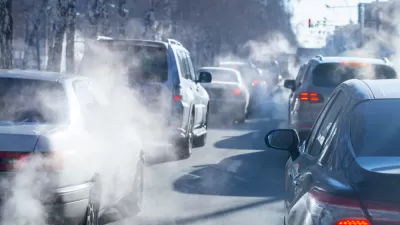With the adoption of the "Spare the Air - Cool the Climate" program, the Bay Area's air quality regulatory agency has broadened its mission to make reduction of greenhouse gases a paramount goal, along with protecting public health.

Improving air quality has been the focus of the first regional air pollution control agency in the country since its creation by the California Legislature in 1955. However, like many other regional air quality regulatory agencies in California, the Bay Area Air Quality Management District (BAAQMD) has broadened its scope to include climate protection.
With the governing board's unanimous approval of the new program, “Spare the Air, Cool the Climate," also called the 2017 Clean Air Plan, on April 19, that mission has greatly expanded. The program "lays out 85 measures that seek to reduce pollutants from industry, transportation, agriculture, homes and businesses," reports Kurtis Alexander for the San Francisco Chronicle.
No regulations take effect immediately, only a commitment to move forward. Some can be implemented by the district directly, but many will require joint action with other agencies. The district committed $4.5 million to initiate such partnerships.
"The plan lays the groundwork for bringing Bay Area greenhouse gas emissions 40 percent below 1990 levels by 2030 and 80 percent below 1990 levels by 2050," reports Guy Kovner for The Press Democrat. The first goal is consistent with new state legislation, SB 32.
BAAQMD has a long history of regulating stationary sources of emissions, such as from oil refineries, and even the burning of wood in private residences. The district has little control over mobile sources, which compose the largest source of the region's emissions.
"To address transportation, the district will work alongside cities and transit agencies to encourage greener travel —making roads friendlier for electric cars with more charging stations and encouraging regional ride-shares and carpools," adds Alexander. But it has its work cut out as even in the progressive, affluent Bay Area, electric vehicles compose "less than 2 percent of the 5.5 million registered vehicles in the Bay Area," reports Kovner.
Alexander adds that the district "will also seek to discourage overall car use by advocating for freeway tolls during high-traffic times, reductions in on-street parking and a higher gasoline tax."
Related in Planetizen: San Francisco Ahead of Schedule on Ambitious Greenhouse Gas Reduction Goals, April 21, 2017
Hat tip to Janet Strömberg
FULL STORY: Bay Area air-quality agency tackles climate change

Maui's Vacation Rental Debate Turns Ugly
Verbal attacks, misinformation campaigns and fistfights plague a high-stakes debate to convert thousands of vacation rentals into long-term housing.

Planetizen Federal Action Tracker
A weekly monitor of how Trump’s orders and actions are impacting planners and planning in America.

In Urban Planning, AI Prompting Could be the New Design Thinking
Creativity has long been key to great urban design. What if we see AI as our new creative partner?

King County Supportive Housing Program Offers Hope for Unhoused Residents
The county is taking a ‘Housing First’ approach that prioritizes getting people into housing, then offering wraparound supportive services.

Researchers Use AI to Get Clearer Picture of US Housing
Analysts are using artificial intelligence to supercharge their research by allowing them to comb through data faster. Though these AI tools can be error prone, they save time and housing researchers are optimistic about the future.

Making Shared Micromobility More Inclusive
Cities and shared mobility system operators can do more to include people with disabilities in planning and operations, per a new report.
Urban Design for Planners 1: Software Tools
This six-course series explores essential urban design concepts using open source software and equips planners with the tools they need to participate fully in the urban design process.
Planning for Universal Design
Learn the tools for implementing Universal Design in planning regulations.
planning NEXT
Appalachian Highlands Housing Partners
Gallatin County Department of Planning & Community Development
Mpact (founded as Rail~Volution)
City of Camden Redevelopment Agency
City of Astoria
City of Portland
City of Laramie





























